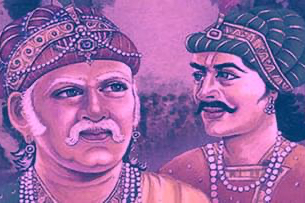Every child is fascinated with the world of stories; the colourful pages add a spark to the imagination and bring immense joy. Readers grow close to characters, easily impressed by their charming personalities. At times, history and folklore blend; fact and legend collide when stories feature prominent names who have shaped the past. A notable example of such stories, the collection of anecdotes about Mughal Emperor Akbar and his clever courtier, Birbal, has left an impact on the folk tradition of India. The tales paint Akbar as a foolish, arrogant king and commonly end with the victory of Birbal’s wit over Akbar’s haughtiness. In certain “challenge” stories, Akbar presents a single line of poetry, prompting Birbal to add more lines, which results in a short poem. Birbal’s wordplay makes him a favourite among readers. His dynamic persona is the key reason why the stories are so amusing. Even Akbar’s arrogance is laughable but, like every story, these classic tales can have multiple dimensions. How much past can be revealed in the Akbar-Birbal stories? Do changes occur in these historical figures when they enter the sphere of myths and legends? C. M. Naim’s work explores these questions in detail. While it’s evident that the stories bear little or no connection with history, Naim points out two stories that may be linked to past events. One of them alludes to an interaction between Akbar and Raja Man Singh when the latter expressed his unwillingness to become Akbar’s disciple. In his quest for harmony in different religions, Akbar adopted the role of a spiritual guide. He invited courtiers to accept a moral code of conduct based on the principles of sulh kul, something that has been popularly termed as “new religion.” In the story, almost as a reflection of Man Singh’s sentiments, Birbal tells the Emperor, “I already recite your kalima, but I shall not recite the kalima that would ruin my religion.” Looking beyond their comic elements, it may seem that the Akbar-Birbal stories are born out of a bitter sentiment against the Mughals. Portraying the third Mughal Padshah as a prickly man whose constant attempts to display his superiority are thwarted by the cleverness of a Hindu courtier, the jokes almost convey anger for Akbar’s rule. It’s perplexing that these stories would choose Akbar for voicing this suppressed rage against the Mughals, for he was a Muslim king who valued teachings from every religion. He respected the diversity in faith and willingly adopted customs like practising vegetarianism and performing sun worship, irrespective of the criticism of the ulema. The orthodox scholar and historian, Abdul Qadir Badauni criticises Akbar’s policies and innovations in his account, Muntakhab-ut Tawarikh. Muntakhab-ut Tawarikh is also the only work of Akbar’s reign which is not dedicated to him. Around 1556, the Mughal court welcomed Mahesh Das, a brahmin from a village near Kalpi. In a career that lasted thirty years, he not only became an eminent noble but also gained a special place in the Emperor’s heart. Posterity would remember him by a different name, Birbal. Raja Birbal’s personality must not be solely defined by the jest and repartee evident in the popular jokes. He had other notable talents. Birbal composed poetry in Braj. His poems were appreciated at the court and earned him the title, Kavi Rai. According to Naim, Birbal’s wit is highlighted for the first time in the biographical dictionary of Mughal nobles, Ma’athir al-Umara. This early 18th century work mentions that Birbal’s sharp witticism and verses made him a treasured companion of the Emperor, who often favoured him over all other nobles. The author of Ma’athir al-Umara further praises Birbal by highlighting his generosity. Turning to history, one shall find sufficient evidence highlighting the deep friendship between Akbar and “his wise courtier.” Badauni, clearly unnerved by the rising popularity of Birbal, notes that Birbal grew close to Akbar by appealing to his peculiar nature and, along with earning a high rank, became “the Emperor’s confidant.” On rare occasions, even the most valued, highest-ranked courtiers would receive the admonition of the Padshah when their actions disappointed him. Birbal was one of the three select men who were never subject to Akbar’s reproach. He shared this special honour with the acclaimed musician, Tansen and the poet laureate, Abu’l Faiz. Raja Birbal had firm loyalty toward the Emperor. Birbal was the only Hindu out of the 18 nobles who accepted Akbar’s spiritual leadership, a stark contrast to the folktale where he represents Man Singh’s opinion. Perhaps, the strongest testament to their friendship is the harrowing sorrow that Akbar feels at the death of his courtier. Accompanying Zain Khan Koka, Birbal was sent on a campaign against the Pashtun Yusufzais. Considered the worst defeat of Akbar’s reign, the “Yusufzai Disaster'' claimed the lives of over 8,000 Mughal soldiers, including Birbal. Stung by the loss of his dearest friend, Akbar was unable to look over the state affairs for some days. Badauni writes that the Padshah had never displayed such grief at the death of any other amir. The Akbar-Birbal tales form part of the tradition revolving around the pair of a king renowned for his glory and a jester with an unmatched wit. The presence of a jester is essential to legitimize the position of the king. In Indian stories, the social class of the jester also becomes significant. In the case of Akbar, the tales feature a jester like Birbal, a brahmin who can justify the authority claimed by the Mughal Padshah. Overlooking the slight communal tilt of these jokes is unfair, but it is important to consider other dimensions too. Also, one must not forget that these popular tales are mainly aimed at laughter and absurdity. Naim makes an interesting point when he mentions how these stories attempt to humanise Akbar. Truly, as the anecdotes bring a lighter side of Akbar’s “great” personality, the distance between him and the readers fades. The friendship of Akbar and Birbal reflected the best of their personalities; it remains a sincere bond immortalized in both history and folklore. References: ● Naim, C. M. “Popular Jokes and Political History: The Case of Akbar, Birbal and Mulla Do-Piyaza.” Economic and Political Weekly, vol. 30, no. 24, 1995, pp. 1456–64. JSTOR, http://www.jstor.org/stable/4402881. Accessed 7 Jan. 2023. ● Mukhoty, Ira. Akbar: The Great Mughal, ALEPH BOOK COMPANY, 2020. ● Chandra, Satish. Medieval India: From Sultanat to the Mughals 1526-1748 PART TWO, Har-Anand Publications, 1999, 2020 (reprint)







